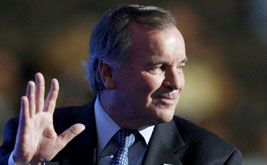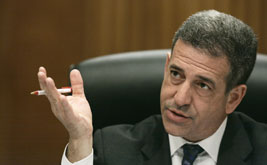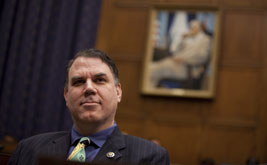Somewhere in Cyberspace
I am transformed from defeat to victory by the insightful articles in your forum "Debating Obama" [Aug. 30/Sept. 6]. Thank you for defending the idealism of President Obama in a shark-infested Congress.
RON SMITH
Somewhere in Colorado
I'm furious about "Debating Obama." The picture of Obama on your cover creates an impression of sadness and failure. The forum begins by saying how disappointed people are in his presidency. Then you tell the real story: how the Bush legacy, the structure of the Senate, the power of money, the culture of finance, entrenched ideology, the aggressive dishonesty and partisanship in the conservative media, and the weaknesses of the MSM are the reasons Obama has had to compromise on his pledges. Why not make that the lead instead of making the reader feel bad at the outset? Give Obama some help instead of putting him down!
GAIL MOORE SUGGS
Hollywood, Fla.
Count me among the disappointed progressives. All the forum responses were brilliant. As a black man I was impressed by Salim Muwakkil's comments on Eric Alterman's reluctance to include an analysis of how race has affected Obama's presidency. Many white Americans continue to deny that the Tea Party is driven by mostly elderly white people's refusal to accept a black man as president.
Michael Kazin's statement that "no presidential campaign...can substitute for a social movement" is true. But forgive this political idiot for believing we had such a movement when I watched the cross section of society at the victory rally in Chicago. I agree completely, however, that "the American right cannot pose a single serious answer to any problem plaguing the United States or the world." In this lies my hope that we will not be annihilated in November.
EVAN JULIEN
Inverness, Calif.
The "Debating Obama" forum spotlighted some big obstacles to progressive change, but the discourse was notably hazy about presidential accountability for calamitous policies. It was a bad sign that the word "Afghanistan" did not appear anywhere in the forum's seven pages. (What would we say about a "Debating Johnson" forum in August 1966 that didn't mention Vietnam?) Whatever the limits to the president's options, he wields gargantuan power—and makes fateful choices.
While the political terrain is cemented with structural factors, no systemic analysis should absolve government leaders of moral responsibility or basic accountability. "The system" may be to blame, but since when does that let the president—or anyone else—off the hook?
After eighteen months, we should be discussing how progressives might try to bell this cat—a president who has clearly embraced what Martin Luther King Jr. called "the madness of militarism," in tandem with an array of other grim policies, including promulgation of extensive corporate agendas in the guise of "reform" and continuing encroachment on precious civil liberties like habeas corpus. The discussion is spreading inside the Democratic Party.
In mid-August, the entire leadership of the California Democratic Party's Progressive Caucus—by most measures the largest caucus in the state party—mustered a directness in addressing the president that eluded the seven writers in the Nation forum. "We worked very hard for your election as we do for all candidates who seem able and willing to work for progressive social change, and to make a better life for our citizens and for the world," the caucus's executive board wrote in a letter to President Obama. "Your rhetoric often suggests that you share this goal, but your actions frequently prove otherwise. We do not simply disagree with you on a single small issue. Unfortunately our unhappiness and disappointment has a broad scope."
The letter said, "You campaigned against the Bush imperial presidency, and then you expanded it.... In our opinion you have failed, in whole or in part, to deliver on many of your commitments. Instead, you have continued and supported some of the Bush policies that many hoped and believed, based on your utterances, you would quickly terminate." And the letter declared that presidential spokesman Robert Gibbs, like chief of staff Rahm Emanuel, "is not the real problem, Mr. President. We fear you are."
Such deep concerns are widespread—and increasingly corrosive for the Democratic base. Bleak poll data on inclinations to vote this November reflect the demoralizing and demobilizing effects of Obama's triangulation. Below the radar, many party activists are agonizing and questing for strategies as we try to prevent Republican gains and push for progressive policies. If progressives seem to be making excuses for Obama's corporate policies, it casts us as defenders of an untenable status quo—and helps corporate-funded "populists" of the right wing to masquerade as the agents of change.
NORMAN SOLOMON, national co-chair
Healthcare Not Warfare
San Antonio
How could Obama not have foreseen the behavior of the Party of No? The only way you beat the Republicans is by going on the offensive and beating the crap out of them. Period. Not trying to be BFFs. Now everything is half-assed at best: a healthcare plan with no public option; an energy plan based on nuclear power loan guarantees; an "end" to the Iraq debacle, as 50,000 troops remain; an Afghanistan policy that will achieve nothing—all contingent on the idea that we will build on these policies in the future. Let's remember NAFTA, which guaranteed that labor and environmental issues would be addressed in the future. The future never came. Mexico is run by drug lords, US workers are competing with 22-cent-per-hour Cambodian workers and the environment is lost in the corporate search for profits. Obama may be right to walk so delicately on the political landscape. But my solar plexus keeps telling me we have missed an enormous opportunity.
ERIC LANE
Ormond Beach, Fla.
I was halfway through the forum when it occurred to me that neither the word "war(s)" nor the phrase "military-industrial complex" appeared anywhere. Americans could have been proud of a commander in chief of the armed forces who, as Job One, had stopped the killing of Middle Easterners as a start to dismantling the empire, which is bankrupting us economically and morally.
EDWARD J. FLANAGAN
New York City
I offer this addition to Eric Alterman's paragraph on the Senate: the fact that the rural states, no matter how sparsely populated, are allotted two senators each, while the more urban, highly populated states are limited to the same number, is not only antidemocratic; it also makes it well-nigh impossible to advance an urban agenda—one that would adequately support, for example, educational and cultural institutions, sound urban infrastructure and high-quality public transportation. It will be virtually impossible to change this imbalance, because it would require a constitutional amendment, which the rural senators would never sign on to.
ROXANNE WARREN
Denver
The forum's pile-up of lefty despair whined about centrist Democrats instead of shouting down Republican obstructionists. Over the years the right has opposed Social Security, the Civil Rights Act, Medicare, the Clean Air and Water acts, and the decriminalization of homosexuality. Without decades of struggle by progressive citizens, enlightened jurists and politicians, we would still be divided by apartheid and breathing toxins, knee-deep in social and literal sewage.
We are not. We are breathing freer in a cleaner, more equal society. The evidence abounds here in Denver, which has gone from 200-plus bad air days annually in the 1970s to zero—zero!—throughout the 2000s. Down the street, the struggling public school has steadily improved into a magnet for kids and parents. The public housing projects I deliver meals to are sparkling clean and packed with free therapeutic programs. My neighborhood has been transformed by rapid transit, free bicycle kiosks and traffic calming. We must fight the right by shouting out what the left has won for us all.
LEE PATTON
Bay Harbor Islands, Fla.
I would like to express my growing impatience with the political politeness that prevents even progressives from calling things by their real name. When President Obama named Larry Summers head of his economic team (placing the fox in charge of the hens), he betrayed a promise of candidate Obama, i.e., to fix the economy. Obama owes his victory to the millions who saw in him a real promise. And also, of course, to the many more millions—of dollars—that Wall Street poured into his campaign. As shown by his choice of Summers, he decided to favor the latter over the former.
JULIO RODRIGUEZ-LUIS
Alterman Replies
New York City
I thank all the forum respondents and those who wrote in, pro and con. Space does not permit the replies they deserve, but I offer here a few clarifications. With regard to Evan Julien's—and Salim Muwakkil's—comments about race, I agree. But I don't see their relevance to my argument regarding the roadblocks to progressive legislation under a liberal Democratic president and a Democratic Congress—which was, after all, the topic of my essay.
Regarding the many comments about Afghanistan: I share these concerns and wish Obama had decided to approach the issue in a radically different fashion. But it behooves us to remember that whatever we may think of his decision, this is one campaign promise Obama is keeping. He campaigned on a surge in Afghanistan, and we got one. It is a separate issue from the ones I addressed, which were largely what I saw to be structural impediments to his ability to keep the progressive promise of his campaign.
As for "beating the crap out of" Republicans, as Eric Lane suggests, well, this again, is not the campaign Obama ran on, and it is not clear how he would do it with a divided party, which is just as beholden to some of the same corporate interests as are the Republicans. That does not mean there is no difference between the two parties, as some would have us believe; rather, it means progressives need to work harder and smarter to remake their party, as conservatives have remade theirs. I hope to address some of these issues in my book Kabuki Democracy, to be published by Nation Books in January.
ERIC ALTERMAN
Read More
Our Readers and Eric Alterman







